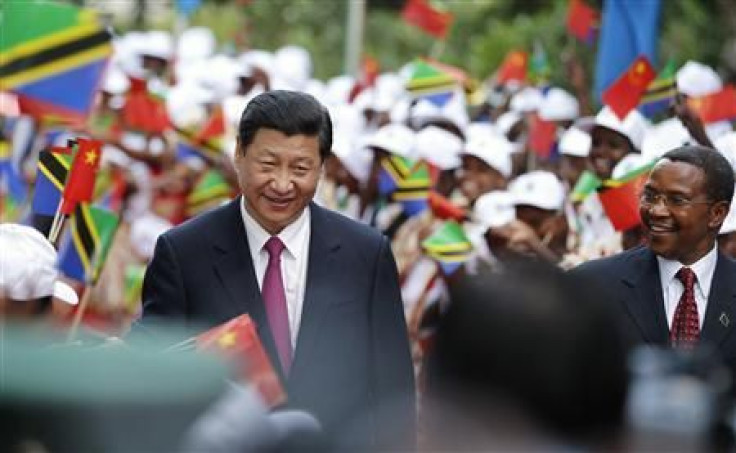Xi Jinping Visits Tanzania: What's In It For Africa?

Tanzania is not the most obvious place that comes to mind as the destination for the president of the world's second-biggest economic power on his first visit to another continent. But on Sunday, China's new leader Xi Jinping and his wife, Peng Liyuan, arrived in Dar es Salaam, on the first leg of the Chinese leaders’ three-country African trip.
Following Xi’s visit to Tanzania, he will attend a meeting of BRICS (Brazil, Russia, India, China, South Africa) leaders in Durban, South Africa, and make a final stop in Congo before returning to Beijing. Xi made his first official international trip to Moscow last week, meeting President Vladimir Putin of Russia and discussing relations between that nation and China, as well as a major oil deal that includes supporting the construction of a natural gas pipeline between the two countries.
In Africa, however, Xi’s goals are distinctly different. The president is highlighting China’s trade ties with Africa as the nation begins to turn to the continent for both natural resources and as a potential thriving marketplace.
However, China is facing the task of convincing Africa that it will approach Sino-African relations in a symbiotic manner, not just strip the resource-rich nations of Africa of their raw materials and flood them with Chinese-made goods. Yet many wonder how countries like Tanzania, which is rich in minerals, timber, natural gas and potentially oil, will benefit.
“These are key issues to crosscheck: They [Chinese] are looking for resources to feed their industries, which Tanzania can provide,” Professor Abdallah Safari, former director of Tanzania-Mozambique Center of Foreign Relations, said to the Citizen. “But what does Tanzania get in return?”
According to the Citizen, China has been the most active foreign nation in helping the East African nation develop improved infrastructure, and offered technical support. Before leaving Beijing, Xi addressed the nation’s goals in Africa, highlighting a relationship that has been a half-century in the making.
“China and Africa are one family,” Xi told the reporters, citing the case of the Tanzam railway, a 1,850-kilometer (1,100-mile) line between Tanzania and Zambia built with the help of China in the 1960s. The railway made it possible for landlocked Zambia to transport its exports and imports via the Indian Ocean.
The consensus among many cautious Africans is that there is still room for more.
Experts in Tanzania are suggesting a different approach to Sino-African relations, one which is more balanced. Bashiru Ally, of the University of Dar es Salaam, said that “it is a one-way relationship” which needs to change.
“The ideal situation would be for the relationship to change to an equal profits one,” Ally said.
Upon Xi’s touchdown in Tanzania, CNN’s David McKenzie, former Nairobi-based correspondent and current China correspondent for the network, asked his followers what they thought of China-Africa relations; many responded with caution.
- Khadija Saleh (@1st_Officer) March 24, 2013
@mckenziecnn while china gets Africa's richness and Tanzania becomes poor and poor #TokaAfrika
- Juan Pablo Rdz G (@jpablordgz) March 24, 2013
In South Africa, China has made a thriving market for itself. According to the Asahi Shimbun, a Japanese newspaper, China has opened up a gigantic 18,000-square-foot commercial complex that sells Chinese goods in Johannesburg and has become increasingly popular among South Africans.
The giant facility, known as "China malls," has gained traction in the South African market because the wide array of goods that are sold, including food, clothing, appliances and furniture, at cheap prices.
For now, however, China is currently coming out on top when it comes to mutual benefiting from Sino-African relations.
© Copyright IBTimes 2024. All rights reserved.












